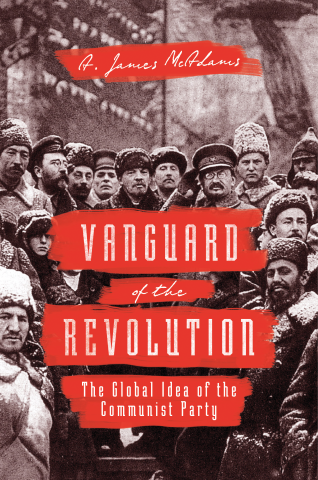Book Review: Vanguard of the Revolution
Vanguard of the Revolution: The Global Idea of the Communist Partyby A. James McAdamsPrinceton University Press, 2017Vanguard of the Revolution, the big, important new book by A. James McAdams, has the outsized ambition of being “a post mortem on the long life and unexpected demise of a global institution,” with the emphasis throughout on that 'global' part:
The Global Idea of the Communist Partyby A. James McAdamsPrinceton University Press, 2017Vanguard of the Revolution, the big, important new book by A. James McAdams, has the outsized ambition of being “a post mortem on the long life and unexpected demise of a global institution,” with the emphasis throughout on that 'global' part:
When Gorbachev came to power in 1985, [Communist Party] members could legitimately count themselves as participants in a global institution. For more than a century, and long before the advent of the phenomena that we associate with globalization today – international currency flows, supranational corporations, the Internet, and social media – the communist party could be found everywhere. It reached across continents and into disparate countries, sprawling urban centers and tiny peasant villages, crowded factories and university discussion circles. Out of the 162 countries in the world in 1985, twenty-four were ruled by communist parties.
Spotlighting the enormity – and seeming viability – of the Communist world (for unknown reasons, McAdams has chosen not to capitalize “communist” at any point in his book's 600 pages – he uppercases it in any applicable title – “Communist Party politics,” etc. – but in general usage it's lowercased, as if it weren't referring to any one proper thing as distinct from all other proper things; it's intensely annoying, but in a book this brilliant, allowances must be made for weird author eccentricities) gives McAdams' book an epic feel as a reading experience, and this feeling is further enhanced by the author's astute warning against deterministic thinking. The millions of people living and dying inside that Communist world couldn't know what would happen in 1989 and 1990:
After all, the people who were moved by this concept were living their lives forward. They were making choices about which types of political action had the best chance of realizing their dreams. They were acting on the basis of limited information under uncertain conditions. Despite their membership in a purportedly comradely association and their participation in an international movement, these figures were frequently caught up in the internecine battles over both the minutiae of party doctrine and the role of violence in pursuit of their revolutionary mission.
That the Communist system was fraudulent from its very inception is a point McAdams hardly needs to stress; “unless they were imposed by an external force,” he points out early in the book, “few communist parties found their way to power as a result of the popular upheavals that the founders of the movement anticipated.” Instead, propagation of the system was accomplished through conquest, intimidation, forced collectivization, and weaponized famine (about this last see Anne Applebaum's excellent new book Red Famine). The Bolshevik Party in the wake of Lenin's death lied constantly about its 'vision,' but in reality, as McAdams points out, from the outset it had no real plan for actual governing and thus quickly sank into the rut of all the autonamies it had lied about condemning:
Before their ascent to power, their focus was on tearing down institutions. In their view, the path toward socialism could be cut simply by eliminating the bodies that stood in their way. The first institution to go was the Provisional Government. However, they quickly realized that their survival depended on their ability to replace old institutions with new ones … the principle of party rule could not feed returning war veterans, house refugees, restart damaged industries, and restore domestic trade. Lenin admitted as much in an exchange with Trotsky. “You know,” he said immediately after the Bolsheviks shut down a newly elected constituent assembly in January 1918, “from persecution and a life underground, to come back so suddenly into power … Es schwindelt ('It makes your head reel').”
McAdams follows the story of Communism from its factional birth (the book's priceless cover shows that first generation, a crowd of snow-covered bruisers in ushankas, all frowning mightily for the camera), through its heyday half-century of threatening the world and gobbling up territory, to its sudden collapse under Gorbachev and sad twilight in Cuba. It's been nearly a decades since Robert Service's Comrades presented readers with a history of Communism on a global scale, and although the idea is still as dead as Jacob Marley, McAdams finds even more to tell about it, and is fascinating and judicial the whole time he does so.